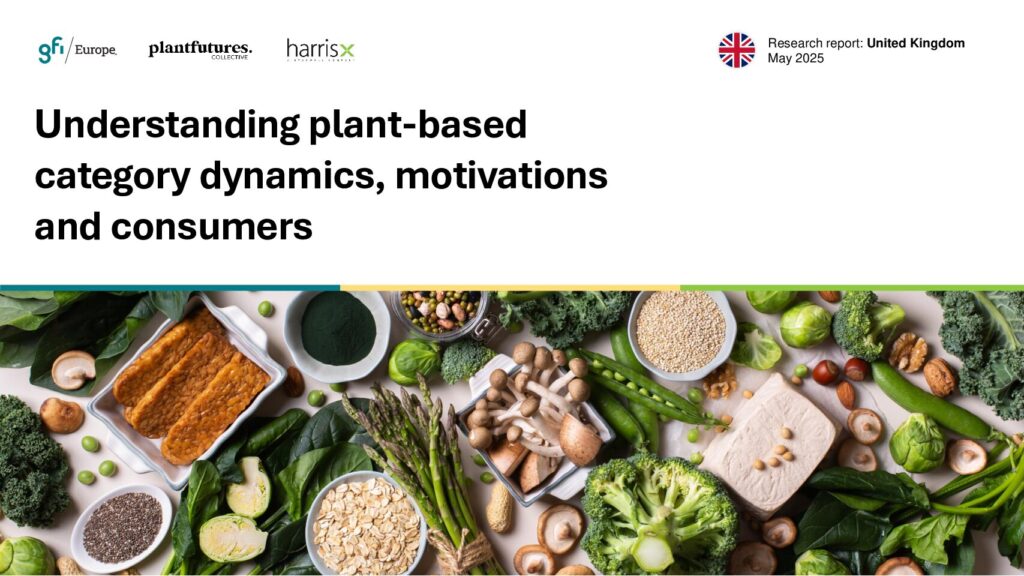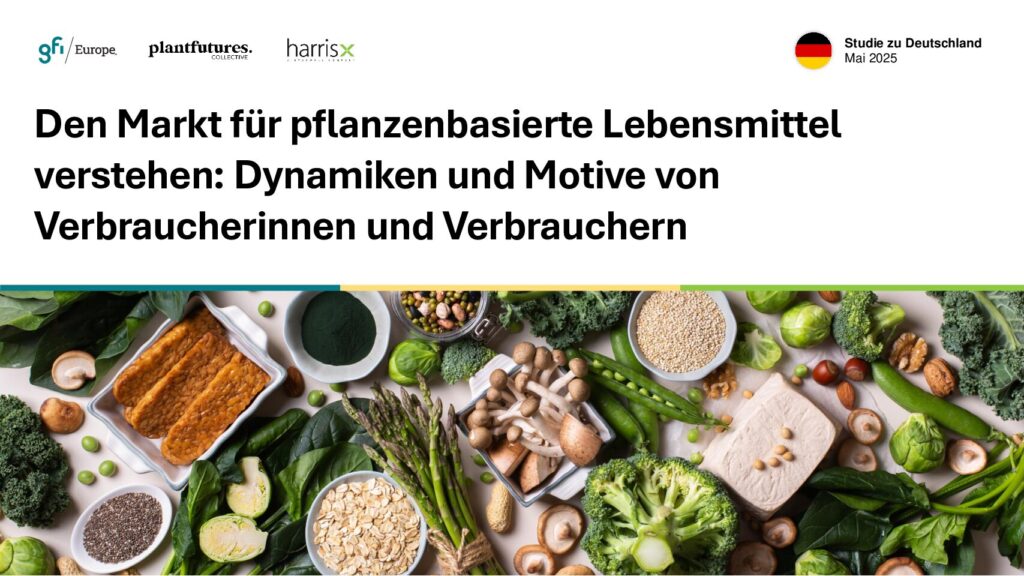Mainstreaming healthier, more sustainable diets: the motivations and dynamics driving plant-based uptake in Germany and the UK
Diet shift is a top priority both for public and planetary health. Our new research explores attitudes and levers driving uptake and resistance in two of Europe’s largest plant-based markets – Germany and the UK.

Our new research, conducted in partnership with the Plant Futures Collective and market research agency HarrisX, reveals widespread flexitarian eating habits, as well as intent for further dietary change – but consumers need more support in overcoming barriers to eating plant-based foods.
The research found that 47% of German adults report that they are already actively reducing their intake of meat (39%) or following a meatless diet (8%). In the UK, the figure is 41%, with 31% reporting actively reducing their meat intake and 9% saying they follow meatless diets (vegan, vegetarian or pescatarian)
Which groups of people are open to shifting towards more plant-based foods?
Across both countries, penetration of plant-based products was considerable, with 60% of respondents in Germany and 56% in the UK reporting at least monthly consumption. In category terms, 30% of those in Germany and 27% in the UK reported having drunk plant-based milk within the last month, with plant-based meat slightly lower at 25% and 23% respectively.
Half (51%) of adults in both Germany and the UK expressed desire change their diets to consume either less meat and dairy (33%) and/or more plant-based foods (38%), but variation within these groups existed, both in terms of motivation and demographics. Three main groups of people wanting to change their diet emerged, which were very similar across both Germany and the UK:
Meat & Dairy Reducers
- 13% of German respondents, who tended to be slightly older, mostly women, who were mainly motivated by wanting to stay healthy or lose weight.
- 13% of UK respondents (13%) – who tended to be older people wanting to lose weight. Unlike Germany, in the UK this group had an even gender split.

Plant-Based Increasers
- 17% of German respondents, these tended to be younger, higher-income people with a variety of health and fitness goals. These people generally aimed to follow diets high in protein and low in fat.
- 18% of UK respondents, these tended to be younger, higher income people. In the UK, those in this group were more often men (62%) than in Germany (54%). This group reported a variety of health and fitness goals such as building muscle. High protein and high fibre were the two most common dietary preferences.

More Plants, Less Meat & Dairy
- 21% of German respondents, these people were more often women, aiming for a healthy lifestyle balance, and often motivated by the environment or animal welfare.
- 20% of UK respondents, this group were also looking for a balanced lifestyle, often including weight loss goals, and also were often motivated by the environment, animal welfare, and looking after their family.

In both countries, respondents scored plant-based foods lower than animal meat and dairy on factors such as taste, availability, confidence in cooking, likelihood of their friends and family eating these foods, and likelihood of choosing these foods out of habit.
This suggests that to reach more people, the sector needs to overcome a lack of familiarity with plant-based foods (for example by providing easily prepared product formats and simple recipe suggestions), continue improving taste, and clearly communicate the health and nutritional benefits of plant-based foods.
Recommendations
Based on these results, the report concludes with several recommendations for industry to help build the plant-based sector:
- Normalise: to drive lasting change, retailers and food producers must promote plant-based foods as a natural part of daily life, that are eaten in relatable, everyday settings and at popular usage occasions.
- Know-how: to overcome a lack of familiarity with plant-based foods, the industry can help people gain confidence in choosing plant-based products and preparing delicious plant-based dishes, for example by providing simple recipe suggestions
- Nutritional necessity: the plant-based food industry has a unique opportunity to educate consumers on the nutritional benefits of plant-based foods. By collaborating and using the right platforms, brands can connect with consumers’ health priorities and communicate the opportunities for a wide variety of plant-based foods to contribute to a healthy balanced diet.
- New generation: with signs that the youngest generation of adults in Germany may not be embracing plant-based eating to the same extent as 25-34-year-olds, the industry needs to stay relevant to the needs of younger consumers.
The findings also have relevance for makers of plant-based foods specifically, who may benefit from the following recommendations:
- Select your segment: understand what drives your target audience and makes them feel good, whether it’s protein for muscle gain, weight loss, or sustainability. Tailoring product messaging to highlight the attributes that align with their priorities will attract like-minded consumers to the relevant brand.
- Simple: to bridge the gap between innovation and familiarity, there is an opportunity to develop new products or position existing products using familiar and recognisable formats, cuisines, ingredients, and packaging formats and designs. To create a seamless consumer experience, ensure that products are simple to prepare and that cooking instructions are easy to follow.
- Satisfy: as technology continues to improve, brands must prioritise exceptional taste in the rapidly evolving plant-based market. Brands can use regular consumer feedback and track repeat purchase rates to ensure their products are satisfying, delicious, enjoyable and perceived as high quality.
Read the reports


About the research
Fieldwork
Germany – 10-minute online survey conducted in German between 3 and 17 December 2024.
UK – 10-minute online survey conducted in English between 27 November and 17 December 2024.
Sample size
Germany – 2,433 respondents in Germany, split as follows:
- N = 1,096 nationally representative of the German adult population (18+) by age, gender, income and region.
- N = 1,337 additional plant-based consumers who consumed at least one plant-based food subcategory in the last month. This sample is representative of the demographic profile derived from the nationally representative sample.
UK – 2,394 respondents in the UK, split as follows:
- N = 1,062 nationally representative of the UK’s adult population (18+) by age, gender, income, ethnicity, and region.
- N = 1,332 additional plant-based consumers who consumed at least one plant-based subcategory in the last month. This sample is representative of the demographic profile derived from the nationally representative sample.
Weighting process
The total sample was weighted to accurately represent the incidence of plant-based consumers (% of population who have consumed at least one plant-based subcategory in the last month) within the nationally representative adult population to ensure we are not over-representing plant-based consumers.
Plant-based categories covered
Plant-based meat, plant-based fish/seafood, plant-based milk, plant-based dairy, plant-based eggs / egg alternatives, tofu, seitan, tempeh, vegetable-based meals, plant-based desserts.
COM-B framework
The survey asked consumers to score both plant-based and animal-based foods across a range of factors drawn from the COM-B model.
The COM-B model is a framework for understanding behaviour change. It identifies three essential components that must be present for any behaviour to occur. These are:
- Capability (C): The individual’s physical and psychological ability to perform the behaviour in question.
- Opportunity (O): The social and physical external factors that make the behaviour in question possible.
- Motivation (M): The internal processes that direct and encourage the behaviour, including both reflective (conscious) and automatic (unconscious) motivations.
We were interested in two behaviours (B): the intent to increase the consumption of plant-based foods and the intent to reduce the consumption of animal meat and dairy.
Existing research and knowledge was consolidated to create a long list of attributes that fall under each of the COM-B components.
There were 16 COM-B questions asked about plant-based foods, and 16 about animal meat and dairy foods. The questions about animal meat and dairy mirrored the questions asked about plant-based foods so we could make direct comparisons.
